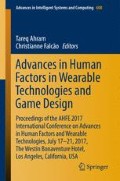Abstract
Intelligent Personal Assistant (IPA) has experienced an important market growth, therefore, an increase in its development by having more people interested in devices that use this software. This opens possibilities for develop new games that people can be interested in. This article presents a framework proposal to create audio games using IPA enabled devices. In order to evaluate the framework, a prototype was designed and presented to 30 participants. The results obtained indicated that a 97.6% of the interviewees were attracted to the idea of playing a game using and IPA.
Access this chapter
Tax calculation will be finalised at checkout
Purchases are for personal use only
References
Guha, R.: User modeling for a personal assistant, pp. 275–284 (2015)
Barbosa, K., Funk, L.Ã.: Personal digital assistants in orthopaedic surgery, 135–139 (2005)
Hauswald, J., Laurenzano, M.A., Zhang, Y., Li, C., Rovinski, A., Khurana, A., Dreslinski, R.G., Mudge, T., Petrucci, V., Tang, L., Mars, J.: Sirius: an open end-to-end voice and vision personal assistant and its implications for future warehouse scale computers, pp. 223–238 (2015)
Jones, A., Kendira, A., Moulin, C., Barthes, J.-P.A., Lenne, D., Gidel, T.: Vocal interaction in collocated cooperative design. In: 2012 IEEE 11th International Conference on Cognitive Informatics and Cognitive Computing, pp. 246–252 (2012)
Azaria, A., Hong, J.: Recommender systems with personality. In: Proceedings of the 10th ACM Conference on Recommender Systems - RecSys 2016, pp. 207–210 (2016)
Enembreck, F., Barthès, J.: Architecture d ’ un système de dialogue avec un Agent Assistant, pp. 96–103 (2003)
Kiseleva, J., Crook, A.C.: Predicting user satisfaction with intelligent assistants, pp. 45–54 (2016)
Carter, M., Allison, F., Downs, J., Gibbs, M.: Player identity dissonance and voice interaction in games. In: Proceedings of the 2015 Annual Symposium on Computer-Human Interaction in Play - CHI PLAY 2015, pp. 265–269 (2015)
Jagex Ltd.: RuneScape (2017). https://www.runescape.com/alexa
Warner Bros.: Wayne Investigation (2016, 2017). https://developer.amazon.com/blogs/post/Tx234I65DC
Östblad, P.A., Engström, H., Brusk, J., Backlund, P., Wilhelmsson, U.: Inclusive game design. In: Proceedings of the 9th Audio Mostly: A Conference on Interaction With Sound - AM 2014, pp. 1–8 (2014)
Dille, F., Zuur Platen, J.: The Ultimate Guide to Video Game Writing and Design, 1st edn. Lone Eagle Publishing Company, Los Angeles (2008)
González, C.S., Gómez, N., Navarro, V., Cairós, M., Quirce, C., Toledo, P., Marrero-Gordillo, N.: Learning healthy lifestyles through active videogames, motor games and the gamification of educational activities. Comput. Hum. Behav. 55, 529–551 (2016)
Acknowledgments
This work was partially supported by the Escuela de Ciencias de la Computación e Informática, Universidad de Costa Rica.
Author information
Authors and Affiliations
Corresponding author
Editor information
Editors and Affiliations
Rights and permissions
Copyright information
© 2018 Springer International Publishing AG
About this paper
Cite this paper
Cicció, J.A., Quesada, L. (2018). Framework for Creating Audio Games for Intelligent Personal Assistants. In: Ahram, T., Falcão, C. (eds) Advances in Human Factors in Wearable Technologies and Game Design. AHFE 2017. Advances in Intelligent Systems and Computing, vol 608. Springer, Cham. https://doi.org/10.1007/978-3-319-60639-2_21
Download citation
DOI: https://doi.org/10.1007/978-3-319-60639-2_21
Published:
Publisher Name: Springer, Cham
Print ISBN: 978-3-319-60638-5
Online ISBN: 978-3-319-60639-2
eBook Packages: EngineeringEngineering (R0)

